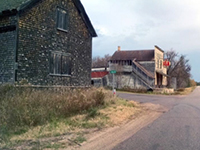-
Wells Township Background and Brief History*
Wells Township is located in the very southern portion of Marquette County, in the Central U.P. It borders three Counties: Delta and Menominee to the south and Dickinson to the west. The Township is very rural in nature and covers 155 square miles (99,200 acres). The City of Marquette is approximately 40 miles north and the City of Escanaba is approximately 30 miles to the south.
Wells Township was officially organized in 1903 from land belonging to Forsyth Township. Boundaries changed in 1909 as areas of Wells Township lying within T43N, R25W east of the Escanaba River became part of Turin Township and areas within T42N, R24W west of the Escanaba River were detached from Turin Township to become part of Wells. Early homesteaders in the area maintained a livelihood by farming and cutting timber. Logging camps were operating in the area in the mid-1850s, northeast of Watson. Oxen were used to deliver supplies to the camps via a tote road that started in the Cornell area – known today as the Boney Falls Road. The Escanaba and Lake Superior Railroad constructed a station in Watson in 1899, which opened up the area for settlement. Railroad expansion allowed for stations to be developed in Mashek, Reade, Northland, Ross, and Gleason. Northland was founded in 1897 by the Wolverine Cedar & Lumber Company, in anticipation of the expanding railroad.
George Mashek and his partner, Ed Arnold, owned a logging camp at Watson in the area of the present Jaeger house. In 1908, a store, boarding house, warehouse and saloon were established. Mashek's general store included a post office area which opened in 1909. Since a downstate community was already using Watson for a post office name, the name Arnold was substituted. Those living in the Watson area received their mail through the Arnold Post Office, Watson, Michigan. In 1935, the post office was relocated to the store at the corner of CR 426 and CR 557. Over the years, the term "Arnold Post Office" has become the name associated with the place originally known as Mashek. Following the height of the logging era, people who settled in the area made their livelihoods principally by farming. Most farming was done on a small scale supplemented with animals, gardens, and timber cutting.
Today, like it was then, distance continues to be an issue for Township residents. Opportunities that once existed for workers in the logging industry are much fewer due to the new methods and advanced mechanization now employed. Small-scale farming is not feasible as a means of making a living in today's world. While the methods, capital requirements, and overall business economics of logging and agriculture have changed, both continue to be major economic factors in the Township.
*Information is an excerpt from the Wells Township Master Plan 2016.
